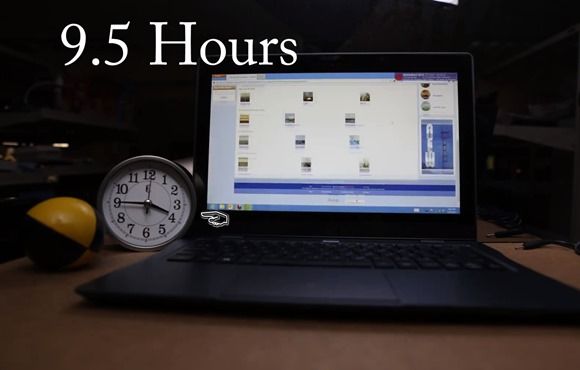Sure, we can all get an Ultrabook to run for 10hrs. I did it myself recently when I put a Samsung through a typing test but how about being online and running web apps? Running the web through a browser is one of the most taxing things you can do to a laptop so seeing 9.5hrs runtime in a MobileMark2012 test is something worth checking out, in 60 seconds with a timelapse video. Haswell is doing the business.
Before we can qualify this result though we need to know a few things.
1) What was the battery capacity?
2) Was it online?
It looks like it’s an Intel reference design Ultrabook being used. I have the same one here (an Ivy Bridge version) that I’m not allowed to talk much about but inside that you’ll find a battery very similar in size to the one I did the 10-hour typing test on. It’s average for the Ultrabook category. Looking at the video it appears that WiFi is on, connected to a hotspot but not connected to the internet.
I’ll try and get confirmation on those two things but let’s assume i’m right…
Update: The battery size in the test was 53Wh. That’s about the same as I assumed.
Screen brightness varies through the test.
I estimate this scenario takes about 9W on most good Ivy Bridge Ultrabooks and I’ve seen some run at 11W in this test. The best Ivy Bridge Ultrabooks would give 5.5hrs of duration in the above test with the same battery. 9.5hrs is, therefore, stunning!












Intel is talking about a lot more conservative, 40-50% gains now.
Here’s how I expect it to play it out.
40-50%: Straightforward move of an identical system to Haswell. For example, Haswell based refresh of XPS 12, Yoga 13, etc.
In 3-6 months time-
Lower cost Ultrabooks with 50% gain
Highly optimized configurations, with new features like Panel Self Refresh, lower power next gen displays, for almost 2x gain.
I think the gains are very much scenario dependant. Huge improvements have been seen on (highly optimised) Clovertrail WIndows 8 devices with CS so as I’ve talked about before, the dynamic range is increasing. Some scenarios (gaming for example) may not see much battery life improvement at all.
Disappointed that there has been no announcements notebooks using IGZO at Computex. Hopefully Apple will announce some Macbooks or Ipads with IGZO displays on Monday, not just LTPS displays again. I have high hopes for an Ultrabook with both Broadwell and an IGZO display in 2015.
I may not be grasping the basis of the measurement, but whenever I see reference to “Mobilemark” I think: benchmark/simulation that vastly overstates “real world” run time based on what I have observed in the few professional reviews that rely on MobileMark (most do their own realistic scenarios).
There’s no reason to believe such results can be achieved when Intel doesn’t even claim them, and when so much of battery drain has nothing to do with Intel components.
Looks like Fujitsu has a IGZO Haswell ultrabook! Can’t wait to see the battery life on it.